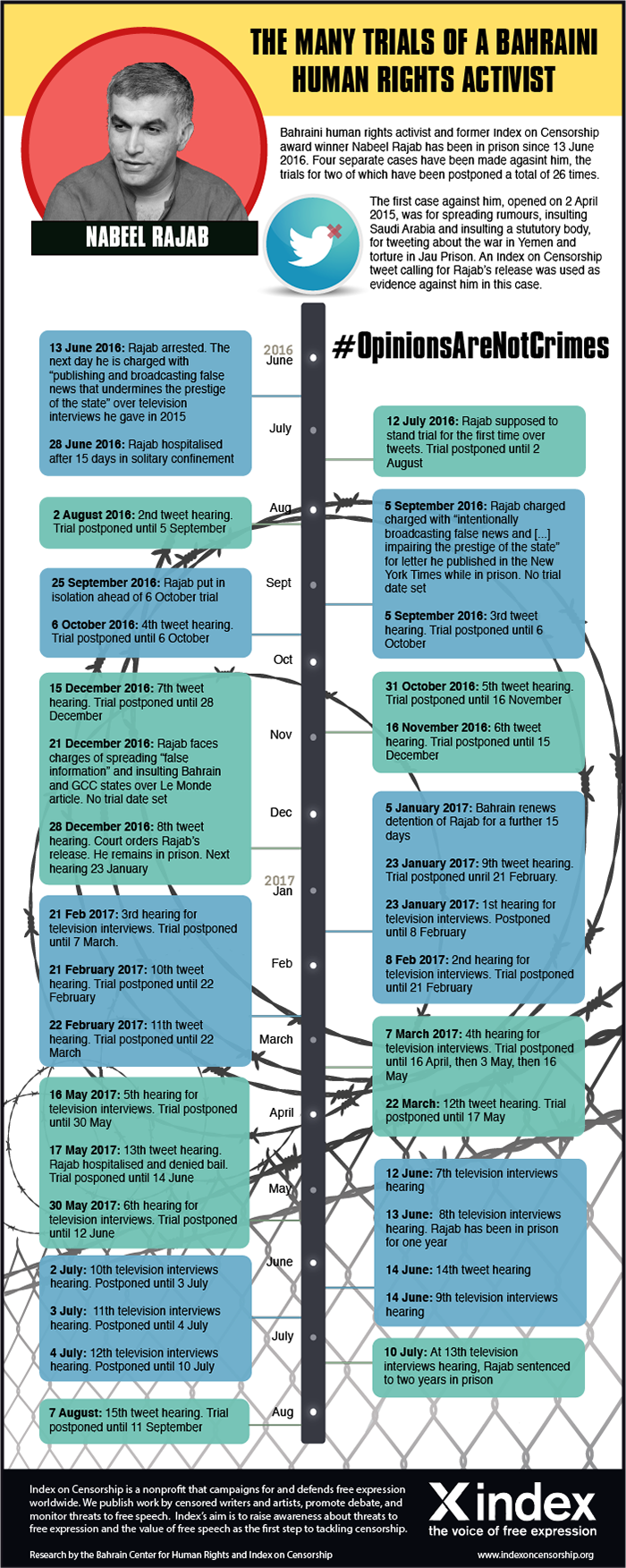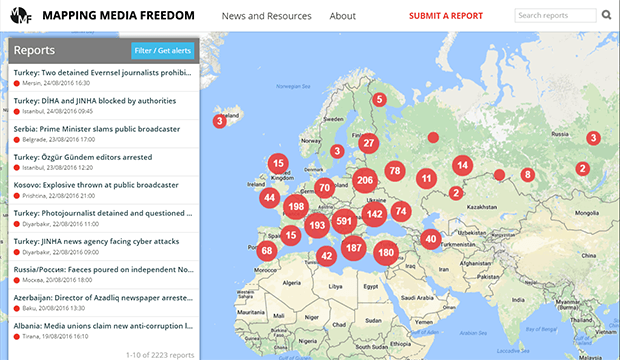29 Aug 2016 | Index in the Press
British police have been criticised for refusing to release details of an international deal to train security officials from Bahrain, a country accused of a litany of human rights abuses. Read the full article
26 Aug 2016 | Bahrain, mobile, News and features
[vc_row][vc_column][vc_video link=”https://youtu.be/GBQX0TvFMbs”][vc_column_text]This article was updated on 31 August 2017
Have you expressed disapproval of your government? Called for more democratic decision-making in your country? Criticised prison conditions or criticised a country allied with your government? Retweeted a comment that included #opinionsarenotcrimes?
You are a criminal. You could be facing up to 15 years in prison for simply expressing your point of view if you lived in Bahrain.
Nabeel Rajab, just like you, thinks his country could be better. And he has made those views public. He speaks out against poor prison conditions and argues for more freedom of speech in Bahrain.
Friday 1 September 2017, marks his second birthday in prison, where he has been since 13 June 2016. He has been subjected to harsh treatment in often appalling conditions that have exacerbated his health issues.
Rajab — due in court on 11 September in one of the cases against him — is facing trial for tweets and retweets about the war in Yemen in 2015, for which he is charged with “disseminating false rumours in time of war” (Article 133 of the Bahraini Criminal Code) and “insulting a neighboring country” (Article 215 of the Bahraini Criminal Code), and for tweeting about torture in Jau prison, which resulted in a charge of “insulting a statutory body” (Article 216 of the Bahraini Criminal Code).
What’s worse, it’s just the latest in a long line of actions taken by the Bahraini government against Rajab, one of the Middle East’s most prominent human rights defenders.
Rajab has been subjected to ongoing judicial harassment, physical intimidation and imprisonment for his non-violent advocacy of democracy and for his calls for an end to endemic corruption. Police officers have beat him up, the country’s press have published the government’s accusations against without his side of the story. He has been imprisoned, pardoned, banned from travelling, rearrested and held in solitary confinement.
Despite the huge personal cost to himself and his family, Rajab continues to speak out.
His activism began during protests in the 1990s and grew with his involvement with the Bahrain Human Rights Society, which he helped found in 2000.
In 2002 he partnered with Abdulhadi al-Khawaja, who is now serving a life sentence for his human rights work, and others to launch the Bahrain Center for Human Rights, which was awarded an Index on Censorship Freedom of Expression Award in 2012. BCHR has consistently spoken out for non-violent resistance and the peaceful struggle for social justice, democracy and human rights.

Nabeel Rajab, BCHR – winner of Bindmans Award for Advocacy at the Index Freedom of Expression Awards 2012 with then-Chair of the Index on Censorship board of trustees Jonathan Dimbleby
Rajab has also been outspoken in working for the protection of the Gulf’s migrant workers, founding, in 2003, one of the first committees in the region to advocate improved conditions for them.
When the Arab Spring swept across the Middle East in 2011, Rajab participated in the pro-democracy protests that were focused on the Pearl Roundabout in the country’s capital Manana. His vocal criticism of human rights violations and outspokenness — even after the government issued a state of emergency and invited foreign intervention to help maintain control — brought him into frequent conflict with security forces.
Born 1 September 1964 to a middle-class family, he went to university in India to study politics, before returning to work in Bahrain. Rajab is married and has two children. He is a nephew of Mohamed Hasan Jawad, one of the “Bahrain 13” — political figures imprisoned for participating in the Arab Spring protests, and a cousin of Hussain Jawad, a prominent human rights activist arrested in February 2015.
What can you do to help?
Silenced temporarily by the Bahraini government, Rajab needs you to use your voice. Speak out in support of free speech and human rights.
 [/vc_column_text][/vc_column][/vc_row][vc_row][vc_column][vc_basic_grid post_type=”post” max_items=”12″ style=”load-more” items_per_page=”4″ element_width=”6″ grid_id=”vc_gid:1504263730538-3d233804-f31e-8″ taxonomies=”3368″][/vc_column][/vc_row]
[/vc_column_text][/vc_column][/vc_row][vc_row][vc_column][vc_basic_grid post_type=”post” max_items=”12″ style=”load-more” items_per_page=”4″ element_width=”6″ grid_id=”vc_gid:1504263730538-3d233804-f31e-8″ taxonomies=”3368″][/vc_column][/vc_row]
26 Aug 2016 | Mapping Media Freedom, mobile, News and features, Ukraine

The armed conflict between the Russian Federation and Ukraine, the occupation of Crimea and Russian support for separatists in Donbas have lead to a large-scale media war, Mapping Media Freedom correspondent Tetiana Pechonchyk writes.
Faced with Russian propaganda, which attempts to stir up hatred, Ukraine imposed a number of restrictions in the media to protect its national security and territorial integrity against its aggressive neighbor. Those restrictions have manifested themselves at different levels and in different ways and touched not only on the Russian media and journalists but also Ukrainian media workers and bloggers who have been accused of being too sympathetic to Russia. In some cases the restrictions have been disproportionate, they have narrowed the space for criticism in Ukraine amid an armed conflict that began in 2014.
The most well-known example is the case of Ruslan Kotsaba, a Ukrainian journalist and blogger, who was arrested in February 2015 for posting a video criticising the country’s military recruitment campaign and called on Ukrainians to boycott it. A month later, on 31 March, Kotsaba was accused of “treason” and obstructing “the legitimate activities of the armed forces of Ukraine”.
After nearly a year and a half in detention — during which Amnesty International named him a “prisoner of conscience” — Kotsaba was acquitted of the charges by the Ivano-Frankivsk court of appeal.
In a second case, Olena Drubych a journalist working for municipally owned Kharkovskie Izvestiya, was fired in March 2016 for republishing material from the Russian website Expert Online, which reported “the Russians celebrated the second anniversary of Crimea returning to the Russian Federation”.
Two reports to MMF involved Russian TV news crews, who tried to work in Ukraine covering events.
In September 2015, Katerina Voronina, a journalist for Russian TV channel NTV was detained along with her driver by representatives of the Right Sector, a far-right Ukrainian nationalist political party, near the administrative border between occupied Crimea. NTV said that the journalist was reporting about a blockade on goods going into Crimea, and was on Ukrainian territory legally. According to the Right Sector website, Voronina, who was questioned for three hours, was filming Ukrainian soldiers. Voronina was then transferred to the Ukrainian State Security Service where she was interrogated for six more hours before being released the following morning.
In April 2016 a film crew from Russian TV channel Mir-24 was denied entry to Ukraine at the Belarusian border by Vystupovychi crossing point border guards. The journalists were planning to visit the abandoned city of Pripyat to report on the anniversary of the Chernobyl nuclear disaster. According to border guards, the four correspondents, who were Belarusian citizens, did not have any permits or other documents confirming the objective of their visit.
As Index on Censorship reported in May, the Ukrainian website Myrotvorets, which publishes the personal data of those it believes to support separatism in eastern Ukraine, posted the identities of over 4,000 journalists accredited by the self-proclaimed Donetsk People’s Republic. Among those named were correspondents working for the BBC, Reuters, AFP, The Independent, Ceska televize, CNN, Al Jazeera, Liberation, ITAR-Tass and RT. Following the release, the site was criticised and announced it was shutting down, but was back online by 19 May.
Ukrainian authorities launched a criminal investigation but observers have little hope of an objective investigation. The website is openly supported by Ukraine’s interior minister, Arsen Avakov and his advisor MP Anton Herashchenko.
Following the initial post on 7 May, Myrotvorets released a second, larger list on 20 May, which contained 5,412 names including 2,082 Russian and 1,816 international journalists. The site has subsequently registered with Ukrainian authorities as a media outlet.
In 2016, Ukraine’s ranking in Reporters Without Borders press freedom index climbed 22 places to 107th out of 180 countries. According to Freedom House’s world press freedom index, Ukraine is a partially free country, up 11 places over 2015.
This article was updated on 2 September 2016 to provide context and clarification to the nature of the media environment between Russia and Ukraine.
26 Aug 2016 | Mapping Media Freedom, mobile, Russia, Ukraine
The conflict over Crimea and the fighting in eastern Ukraine has resulted in a media war, which has left both Russian and Ukrainian journalists struggling to report accurately on the situation, writes Mapping Media Freedom correspondent Andrey Kalikh.
In Russia, the partisan media environment has been driven by state-backed broadcasters. Federally financed TV channels — Russia 1 and RT — toe the government line on events in eastern Ukraine and Crimea. In 2015, the government boosted its funding of media to 72 billion rubles ($1.2 billion).
Mapping Media Freedom is monitoring the situation with Ukrainian media and journalists working in Russia. These are some of the cases filed by MMF Russian correspondents.
Reporting teams working for Ukrainian television outlets were barred from attending the March 2016 trial of Nadezhda Savchenko, a pilot captured by pro-Russian separatists in eastern Ukraine and handed over to Russian military forces. Savchenko was accused of having directed artillery fire that killed two Russian journalists.
Former Los Angeles Times correspondent Sergei Loiko, a Russian, has been repeatedly harassed in Moscow, where he is based, following the publication of articles on the conflict and his book The Airport, a novel set amid the battle for Donetsk airport in eastern Ukraine. In October 2015 he received a threatening phone call, followed in April 2016 by an incident during which four unknown perpetrators approached him as he was entering independent TV Dozhd’s studio to participate in a live programme.
Some journalists have been barred from entering Russia altogether. In one case, Sergei Supinsky, an AFP photographer based in Ukraine, was stopped from traveling to Moscow from Minsk. Supinsky was told he could not board his flight. No reason was given for the ban.
Russian journalists and activists have also become targets for pressure if they are perceived as supporting Ukraine or objecting to Russian involvement in the conflict.
In April 2016, Mikhail Afanasyev, an independent Novaya Gazeta correspondent based in the Republic of Khakassia posted a photo on Facebook of Kiev’s Maidan Square, where he had recently visited. He was immediately targeted with threats and insults by people referring to themselves as “patriots”.
In December 2015, a blogger from the Siberian city of Tomsk received a five-year sentence for “extremist” videos published on his YouTube page. In one of his videos, later removed, Vadim Tyumentsev referred to refugees from eastern Ukraine “who come and stay in Tomsk, although there are enough other problems in the city”. He accused officials of providing more help to the newcomers than the local population.
This article was updated on 6 September 2016 to provide more context and clarification.


 [/vc_column_text][/vc_column][/vc_row][vc_row][vc_column][vc_basic_grid post_type=”post” max_items=”12″ style=”load-more” items_per_page=”4″ element_width=”6″ grid_id=”vc_gid:1504263730538-3d233804-f31e-8″ taxonomies=”3368″][/vc_column][/vc_row]
[/vc_column_text][/vc_column][/vc_row][vc_row][vc_column][vc_basic_grid post_type=”post” max_items=”12″ style=”load-more” items_per_page=”4″ element_width=”6″ grid_id=”vc_gid:1504263730538-3d233804-f31e-8″ taxonomies=”3368″][/vc_column][/vc_row]